Across the CMC curriculum, members of our faculty are meeting the challenge of these unprecedented and historic times, delivering exceptional coursework in a fully online modality for the fall semester. In our Academic Innovations series of faculty Q&As, professors share their curricular highlights, best practices, and how students are helping to shape virtual learning for a memorable, collaborative academic experience.
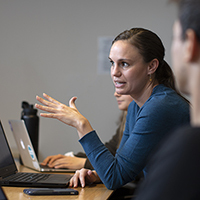
Angela Vossmeyer digs into data for one-of-a-kind fall learning opportunities
Angela Vossmeyer, assistant professor of economics and a faculty research fellow at the National Bureau of Economic Research (NBER), is teaching two courses this fall, “Econometrics” and “Advanced Projects in Data Science.”
What learning opportunities are you seeing as a result of this crisis?
This pandemic is a one-of-a-kind learning opportunity. There is no better time than now to understand data and statistical modeling and their implications for shaping health and economic policies. Every day, we are looking at infection spread data and case counts. We read in the news about predictions and forecasts of where these data are headed. Applying econometrics will give students a better understanding of why some predictions are more accurate than others and why some models are failing.
Read more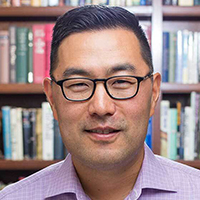
Albert L. Park redesigns courses with Legos, spray paint, and a splash of K-Pop
Albert L. Park, Bank of America Associate Professor of Pacific Basin Studies, is teaching two courses this fall: “Design Activism” and “Modern Korean History.” He is also the co-principal investigator for EnviroLab Asia at The Claremont Colleges.
What are some ways you are reimagining your “Design Activism” class for the fall?
My “Design Activism” course looks at the intersection between social activism and design. First, in response to the pandemic and the protests against racism, I have expanded my syllabus to include more weeks on diseases and how to create effective designs to deal with pandemics and how design can tackle and overcome racism. This class has always tackled racism in the U.S. and globally—especially through topics like housing discrimination against African Americans and embedded racism within the design of buildings. This semester, we will cover how design can take on systems that have created and maintained racism. To help students approach these subjects in ways that are tangible and hands-on, I am sending out design kits with craft materials that students can use to design and build objects each week in class. I am also sending each student a box of Legos for building, chalk spray paint for our exercise on spray painting and activism, and an organic herb starter kit. The herb starter kit will be a way for students to grow their own herbs, which they will use to make their own food dish for class. Growing herbs and making a dish will be a way for students to think about the source of their food and how to redesign the food system in ways that overcome inequality and environmental racism.
Read more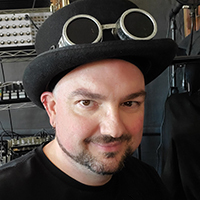
Essays for calculus? Sam Nelson is turning math sideways
Sam Nelson, professor of mathematics and a Faculty Scholarship Award winner, is teaching “Multivariable Calculus” this fall.
What do you think students will enjoy most about your fall course? What will they gain the greatest benefits from virtually?
Multivariable Calculus (Math 32) is always a fun class to teach—for me personally, it was where math started to get interesting. It's the first time students get to think about how things work, not just in the 2-D plane, but in 3, 4, and even arbitrary numbers of dimensions. I'm often asked questions like "Are there really four dimensions?" or "Is time the fourth dimension?" A dimension is just a variable, and there are absolutely real functions—for example the stock market—that depend on hundreds or thousands of variables. In this course, we learn how to understand functions of many variables as they interact and change over time.
Read more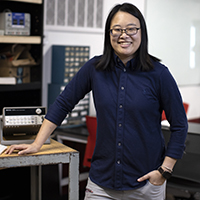
Janet Sheung is ready to launch virtual learning with at-home catapults
Janet Sheung, assistant professor of physics, is teaching “Principles of Physics Laboratory” this fall.
What are some ways you are reimagining your “Principles of Physics” class for the fall?
My science colleagues and I are sending a special box to each of our lab students. It doesn't get more interactive than a hands-on learning experience! I think students will probably be drawn most to the catapult kit they will find in their box. Our physics lab coordinator, Tom Dershem, came across this kit (just under a foot-by-foot in size, can fire ten feet) while researching new labs. Every student I've mentioned this to has been excited. For one of the experiments, the students will work in groups to optimize their catapults for firing distance, and we will see which team does the best. Full disclosure though—I am personally more of a fan of trebuchets, and in fact, am building a small model of one to compare with the winning catapult. There is a lot of physics to be learned from throwing heavy objects.
Read more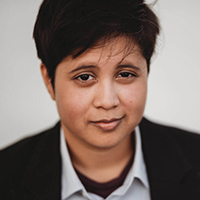
Rima Basu: A Philosopher Levels Up
Rima Basu, assistant professor of philosophy, is teaching "The Challenge of Evil," "Advanced Seminar: Belief Evidence, and Agency," and "Structural Injustice."
What are you most excited about reimagining in terms of a fall teaching experience for students?
I’ve never been one to follow the “sage on the stage” model of standing at the front of the room and lecturing to students. All of my classes are seminar-style and discussion-heavy, and I’ve found that Zoom can be a great equalizer in setting up students to be comfortable speaking up and contributing their own thoughts. My box is the same size as everyone else’s and given the small class sizes at CMC, everyone is literally on the same page. This puts us all on equal-footing in treating the class as a collaborative exercise in learning. One of my classes, The Challenge of Evil, is structured like a role-playing game, and I’m excited about incorporating more role-playing game elements. The goal is to build community through overcoming the trials and tribulations of a campaign, and also explore topics of human nature, the conflict between good and evil, and structural impediments to living a flourishing life. I’m also teaching a new and experimental interdisciplinary class called Structural Injustice. The course addresses the critical questions of our time. It will be team-based, interdisciplinary, student-driven, and disseminate findings in non-traditional formats, including podcasts, videos, and artwork. There will be guest speakers, and at least one role-playing game. I’m most excited about the actual syllabus - including determining readings and assignments – because it will be the first group project for the class.
Read more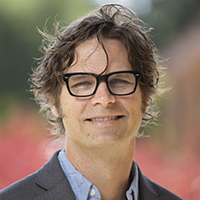
David Bjerk uses analytic toolkit to foster collaboration, interaction
David Bjerk, the Russell S. Bock Professor of Public Economics and Taxation, is teaching “Economics of Poverty, Inequality, and Discrimination” this fall.
What learning opportunities are you seeing as a result of this crisis?
The twin social issues of the past six months---COVID-19 and the social activism and unrest related to race and policing---have thrust the topics of the class I’m teaching this fall to the front of the national discussion. The underlying issues of inequality in health outcomes between the rich and the poor—and racial inequality in not only policing but across almost every aspect of American society— are not new and solving them will not be easy. Providing background on these issues, as well as a toolkit for analyzing the underlying causes and possible remedies, will hopefully equip my students to be informed leaders in this important ongoing discussion.
Read more

